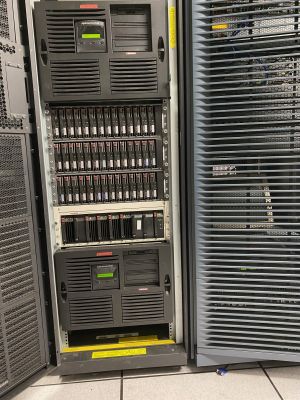Difference between revisions of "AlphaServer ES45"
(→Notes) |
|||
| Line 51: | Line 51: | ||
|} | |} | ||
== Notes == | == Notes == | ||
| − | ''' | + | '''2019/10:''' After spotting some posts on a retro mailing list about some DEC/Compaq gear at Athabasca University that needed rescuing, I started up a conversation with a pair of passionate people who were the caretakers of this gear during it's production lifecycle, and they really didn't want to see the gear go to the scrappers. After some discussions, and the offer of payment for expenses, they kindly strapped the rack full of gear into a trailer and drove it 1000km from it's old home to my data centre. I was completely blown away by their generosity and enthusiasm in making sure that the gear found a worthy home. |
| − | + | It took two years, but as of October 2021, both machines are up and running on Hecnet. They have no local storage, but instead use FC to a HSG80 array full of 42 drives. | |
| − | |||
| − | |||
| − | |||
| − | |||
Revision as of 17:24, 9 November 2021
Configuration
| Node Name | BOB:: |
|---|---|
| Node Number | 42.10 |
| Machine | AlphaServer ES45 |
| Model | DY-68AAA-BA |
| Serial | 4216JSPZA094 |
| Node Name | DOUG:: |
|---|---|
| Node Number | 42.11 |
| Machine | AlphaServer ES45 |
| Model | DA-68DAA-AL |
| Serial | 4144JSPZA085 |
Documentation
| EK-ES240-PD.B01 | Alpha ES40 Tower and Pedestal Basic Installation |
| EK-ES240-RG.B01 | AlphaServer ES40 Rackmount System Installation Guide |
| EK-ES240-RN.C01 | AlphaServer ES40 Release Notes |
| EK-ES240-SV.A01 | AlphaServer ES40 Service Guide |
| EK-ES240-UG.B01 | AlphaServer ES40 and AlphaStation ES40 Owner's Guide |
| EK-ES240-UI.B01 | AlphaServer ES40 and AlphaStation ES40 User Interface Guide |
| EK-ES4M2-UP.A01 | AlphaServer ES40 Model 1 to Model 2 Upgrade |
Notes
2019/10: After spotting some posts on a retro mailing list about some DEC/Compaq gear at Athabasca University that needed rescuing, I started up a conversation with a pair of passionate people who were the caretakers of this gear during it's production lifecycle, and they really didn't want to see the gear go to the scrappers. After some discussions, and the offer of payment for expenses, they kindly strapped the rack full of gear into a trailer and drove it 1000km from it's old home to my data centre. I was completely blown away by their generosity and enthusiasm in making sure that the gear found a worthy home.
It took two years, but as of October 2021, both machines are up and running on Hecnet. They have no local storage, but instead use FC to a HSG80 array full of 42 drives.
